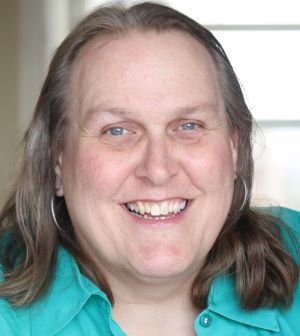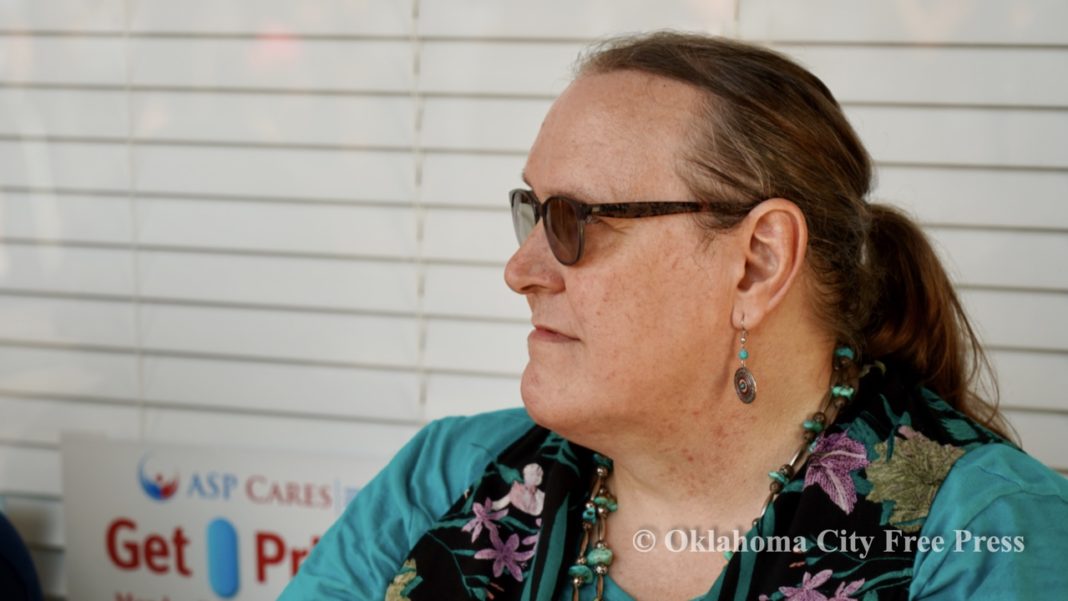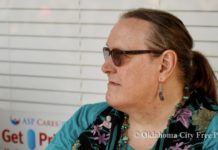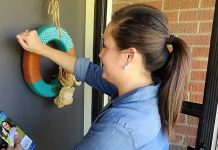Last Updated on January 5, 2024, 12:54 AM | Published: March 25, 2022
Paula Sophia Schonauer, LCSW, continues a serial memoir. If you haven’t read the earlier parts of this series, follow the links at the bottom of this page.
When I called for help, I could barely speak. Seeing Mom lying on the floor and watching Janice trying to keep her from going to sleep was surreal. My mind went blank, but, somehow, I gave the call taker the right information to get help on the way. I stood next to the phone, holding the receiver in my hand, listening as the call taker prompted me for updates, though I was unable to say anything but, “She needs help!”
Sean and Tina were at Mom’s feet crying until Sean stood up, clenching his fists, open and shut, standing rigid, a look of despair on his face.
“Where’s Dad?” he yelled.
I did not realize he was yelling at me. I barely registered what he said. He moved across the kitchen, got into my personal space, eyes red, cheeks red, teeth clenched. “Where’s Dad?”
I struggled to stay in my body, feeling something tugging me away, my hearing overwhelmed by a dull roar rendering everything else mute. My mind sought that cozy numb feeling I had experienced when I almost drowned.
“Where’s Dad?”
I pointed toward Portage Trail, which ran diagonally from southeast to northwest. “The river,” I said. “I think he’s going to the river.”

Sean ran out of the house, retrieved his bicycle from the garage: a red, white, and blue Schwinn with a banana seat and coaster brakes. I saw him peddling down the driveway toward the street.
When the paramedics arrived, the house was full of people carrying tote bags and tackle boxes loaded with equipment, bandages, needles, respirators, and a heart monitor. When one of the paramedics checked Mom’s blood pressure, he looked at his colleague and nodded. Though they were already working with purpose and focus, the intensity of their work increased. They placed an oxygen mask on Mom’s face and forced air into her lungs, checking her pupils, and asking what she’d taken.
“Darvocet,” Janice said while my mind raced, trying to remember what she had said a short time before, but time was getting weird. It seemed like we had been in the kitchen with Mom lying on the floor for a whole day with no end in sight. Then, suddenly, things sped up. The paramedics rushed Mom out of the house on a gurney. Janice took Tina next door.
The kitchen was empty, blood, opened packets, a discarded needle, and bandages on the floor, like the damage after a storm, the silence, too, except for a sudden blast of a siren, loud at first but fading with distance.
I heard the side door open then shut, footsteps on the stairs. It was Janice. She’d come back to check on me. “Where did Sean go?”
“After Dad, I think.”
“Where’d your dad go?”
“Toward the river, I think.”
Toward the river. Toward the bridge!
I darted out of the house, Janice calling after me, feeling the weight of responsibility for my brother AND my dad. I left him alone instead of following him, and I knew what was going to happen. I just knew it. But, at the same time, I wanted to be wrong.
I was running, lungs burning, legs aching, sweat pouring into my eyes. Without realizing it, I had already run three blocks past the Lawsons at 5th street, the spire of Redeemer Lutheran Church prominent in the near distance. Down near 4th street, I remember a car accident Dad and I had experienced years before when he still drove his 1963 Chevrolet Impala. Neither of us were hurt, but we had to get a new car. It was downhill after 2nd street, and my body felt grateful as I let gravity carry my momentum, but by the time I got to Front Street, my legs were shaky, out of control, and I almost stumbled into the street. I ran south on Front Street through the new pedestrian mall that had opened the year before until I got to Broad Boulevard. I was spent, needing to stop for a while to regain my breath and balance. Traffic buzzed around me, sunshine bright on my face. A breeze blew against my neck, drying some of my sweat, and I shivered.
There had been a factory near the Cuyahoga River at Broad Boulevard, a dam and powerhouse on the river behind it. The old Vaughn Factory, which had produced machinery for the rubber and steel industries in Akron closed down in the early 1970’s. My most relevant memory of the place involved Dr. Doom’s Haunted House when they used the site for Halloween in 1973, before the factory had been torn down. The vacant building was the perfect location for a haunted house that year, four or five stories of big, vacant windows yawning darkness over Front Street, then a collection of aging buildings and failing businesses.
After the factory had been demolished, the dam and powerhouse had been left intact with no barriers to public access. The year before, my cousin and I had explored the powerhouse, spooking ourselves in the grimy darkness, the overwhelming odor of mold and mildew, and the moss dripping off the old concrete like an alien blob set to devour the world.
There in the middle of a wide slab of concrete spanning the top of the powerhouse was my brother’s bicycle, or at least I thought it was his bicycle. When I walked over to it, I saw a Batman sticker on the seat post Sean had received from a box of cereal. I looked downriver, glimpsing the observation bridge in the distance several blocks away. Nobody on the bridge. I did not know whether to feel relief or dread. Was I too late? But, if Dad had jumped, where was Sean? My chest tightened, and I felt lightheaded.
I picked up the bicycle and started to ride it. At that time, a man who had been standing in front of the fire station on Front Street across from the Vaughn Dam yelled at me.
“Hey, kid! Is that your bike?”
I rode toward him.
“What?”
“That’s not your bicycle,” he asserted. He was wearing a blue t-shirt with a fire badge decal over the left breast. He had brown hair with gray streaks, a handsome face with gray eyes.
“It’s my brother’s.”
He gave me a side-smile and shook his head. “It’s not your bicycle.”
My eyes welled with tears. Chest tight. I tried to keep from sobbing, but it spilled out. I told the fireman about my dad and how my little brother went searching for him and that I was afraid Dad was going to kill himself by jumping off the observation bridge.
The fireman’s face softened. “Stay here, kid.”
He ran into the fire station for a minute, returning with a police officer, a younger, skinnier man with a thin mustache and black hair.
“What’s your name?”
I started to feel like I was in trouble, that I had misinterpreted the fireman’s evident concern. “Am I in trouble?”
“No,” the policeman said. I told him my name. “We found your dad.”
The kid from the newspaper story came to mind, his green face and vacant eyes, the mushrooms blossoming on his dead skin. “Is he dead?”
The police officer’s eyes widened, a slight panic on his face. “Oh, God, no!”
A wave of relief washed over me.
“He was on the bridge with your little brother. If it wasn’t for your brother, he would have jumped.”
“Then, where is he? Where’s my dad? Where’s my brother?”
He leaned toward me. “We took them to Fallsview.”
Fallsview was a psychiatric hospital across the river and on the other side of the Akron Expressway on State Route 8. I did not know what to think. Mental Hospitals were horrible places with terrible people, at least from what I had seen in movies. I felt the sudden need to run, ashamed from crying and overwhelmed with confusion. Was Mom dead? Was Dad going to be locked away forever as a crazy person?
I started riding away from the fire station, the strain of my effort making my brother’s bicycle snap and groan, chain rattling against the chain guard. I heard the officer and fireman shouting after me, but I kept riding, not knowing where I was going.
Previous episodes
- Manhood, from the inside out — Memoir and Mythology
- Part 2 — Cubby Hole
- Part 3 — Magic Carpet Cocoons
- Part 4 — Snips and Snails and Puppy-Dogs’ Tails
- Part 5 — Mirror
- Part 6 – Deep Water
- Part 7 – Limbo
- Part 8 – Dissociation
- Part 9 – Shame
- Part 10 – Judgement Day
- Part 11 – Inferno
- Part 12 – Haunted
- Part 13 – Did I say that?
- Part 14 – The end times
- Part 15 – Alone again (naturally)
- Part 16 – Welcome to Grey Town
- Part 17 — Stigma
- Part 18 — Turning the other cheek
- Part 19 — Malingering
- Part 20 — Rorschach
- Part 21 – Soft hands
- Part 22 — How real men talk
- Part 23 — Crash landing
- Part 24 — To make a fist
- Part 25 — To hurt another
- Part 26 — Showdown
- Part 27 — Savage aggression
- Part 28 – Heroic
- Part 29 — Fear of death
- Part 30 — To be an android
- Part 31 — Too old for toys
- Part 32 — Her eyes
- Part 33 — A bedtime story
- Part 34 –- Sacrifices
- Part 35 — don we now our gay apparel
- Part 36 — Aspirations
- Part 37 — Doing the math
- Part 38 — Baseball rebels
- Part 39 — Climbing Mount Maslow
- Part 40 — Dear mom
- Part 41 – O Holy Night
- Part 42 — Chrysalis
- Part 43 — The Pain of Loneliness
- Part 44 — A Picture and 900 Words
- Part 45 — A night visitor
- Part 46 — Unnatural
- Part 47 — Oblivion
- Part 48 — An unexpected affirmation
- Part 49.1 – The day I grew up
Guest Columnist Paula Sophia is a licensed clinical social worker in Oklahoma City and a former Oklahoma City Police Officer.







